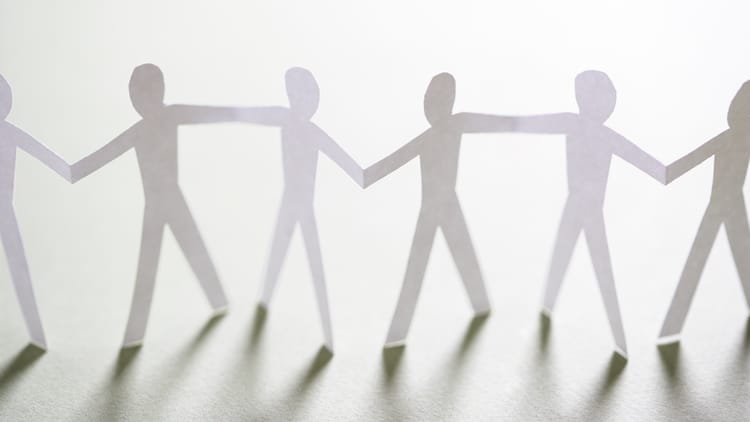How the Gospel Changes Relationships (Colossians 3:1-17)

Big Idea: The gospel creates new people and a new community, which makes a new kind of relationship possible.
For a couple of months now we’ve been looking at the subject of healthy relationships. We just have one week left.
One of the things that I worry about as a series comes to an end is what will change as a result of the series. It’s been my prayer that we would change substantially in how we relate to each other as a result of spending time in God’s Word looking at how our relationships change as a result of what God accomplished for us at the cross.
I know that after the service is over today, some of you are going to face the challenge, for instance, of forgiveness. I know that another group of us are going to have good reason to be ticked at someone. It’s going to be very easy to badmouth them and to voice our displeasure to countless other people. There are going to be all kinds of relational challenges that all of us are going to face. What is going to sustain healthy relationships among us as a church?
Let me tell you what won’t work. What won’t work is simply trying harder. We know this already. In just a month we’re facing a new year. Can you believe it? Someone the other day talked about 2011. I initially thought it sounded so far away that I don’t even need to worry about it anymore. 2011 isn’t that far away.
The reality is that there are going to be lots of people who make resolutions. Some of them are even going to keep some of them for more than a couple of weeks. We know that willpower and self-power aren’t ever enough to bring lasting change. Most of us have tried this, and we’ve realized that we simply don’t have what it takes.
This is especially the case when it comes to the biblical standard of relationships. The truth is that some people do have the willpower to lose weight. Some people do have the willpower to make and keep resolutions. Not many, but some. Nobody has the power to rise to the biblical standard of relationships through self-effort. No-one! We’re going to need more than steely resolve if we are going to see our relationships change for the better.
If we’re going to change, we have to be connected to a power that’s beyond ourselves. The reason why many of us have not changed up until now is that we’ve been trying on our own power. Let me tell you right now: it simply won’t work.
But there’s an alternative. In the passage we have before us, Paul tells us how our relationships can change substantively. Paul says that the gospel creates new people and a new community, which makes a new kind of relationship possible. Let me say that again: The gospel creates new people and a new community, which makes a new kind of relationship possible.
Let’s unpack that.
First: the gospel creates a new people.
We live in an old house, a wartime house built some sixty years ago. When we moved in the floors had been redone, sort of. They hadn’t done a good job. Not only that but the floors had been redone so many times that it wasn’t possible to refinish them one more time. We didn’t need our floors refinished; we needed a brand new floor.
In the passage before us, Paul says that this is what we need as well. Some of us think that we need a bit of sanding, a bit of polishing, a fresh coat of finish. But look at what Paul says in verses 1-3:
Since, then, you have been raised with Christ, set your hearts on things above, where Christ is, seated at the right hand of God. Set your minds on things above, not on earthly things. For you died, and your life is now hidden with Christ in God. When Christ, who is your life, appears, then you also will appear with him in glory.
Paul says that our old self – our lives apart from Christ – wasn’t just refinished. This is so important. Our old selves would never have the power to pursue the biblical teaching on relationships. They were done. Our old selves were like the floor that couldn’t be refinished; the car that couldn’t be repaired; the house that couldn’t be fixed; the sickness that couldn’t be cured. If we attempt to obey out of our old selves, there would be no hope for us at all.
But Paul says that we died, and that we have been raised with Christ. God hasn’t renovated us. He’s remade us. He’s given us new life. Look down at verses 9 and 10 with me:
Do not lie to each other, since you have taken off your old self with its practices and have put on the new self, which is being renewed in knowledge in the image of its Creator.
You see what Paul is saying here? You haven’t been refurbished. If you have something refurbished, it’s been used. You don’t know where it’s been. But it’s been turned in and cleaned up. It’s not new; it’s just made to look like new. It’s like the kid who loves to play outside. His hair is always unkempt and he’s always got dirt and bruises all over, because he loves to be out playing in the backyard. His mother calls him in and brushes his hair and puts him in a suit and takes him to a nice restaurant, but underneath he’s still the same boy who can’t wait to get home and get dirty again. He’s been cleaned up but he hasn’t been changed. That’s not what we need, and it’s not what Paul says has happened to us when we came to Christ.
We haven’t been refurbished, Paul says. We’ve been made completely new. This is what gives us hope. We can change in our relationships. Our old selves have been removed and put to death. If you are in Christ then a new self has replaced it. This makes all the difference when it comes to how we can experience all that God has told us about how to have healthy relationships.
But that’s not all. The gospel creates new people, but it gets even better.
The gospel also creates a new community.
Read verse 11 with me:
Here there is no Gentile or Jew, circumcised or uncircumcised, barbarian, Scythian, slave or free, but Christ is all, and is in all.
This is staggering. In this verse Paul lists different groups of people who would not normally associate together. The barriers between these groups would be huge. You’re talking race, ancestral religion, class and caste. There would be all kinds of suspicion between these groups, which would lead to conflict and unhealthy relationships. You would never want to put a group of these people in the same room and lock the door. This group of people simply would not get along.
So here you have three groups of people, most of whom would be opposed to each other:
- Gentle vs. Jew
- circumcised vs. uncircumcised
- slave vs. free
You may as well add oil vs. water. These three groups just would not get along. Then Paul adds to others to the list: barbarian and Scythian. A barbarian was a bit of a derogatory term. Greeks in that time viewed themselves as being culturally superior, and would mock the way that non-Greeks spoke which sounded to them like “bar bar bar…” So they mockingly called them barbarians. It wasn’t a compliment.
And then you have Scythians, a people group from part of what we would today call the Ukraine. It gets even worse. A Scythian was simply an extreme example of a barbarian. They were thought to be the “epitome of unrefinement and savagery.” They were a violent, uneducated, uncivilized people. The historian Josephus wrote of Scythians: “Now, as to the Scythians, they take a pleasure in killing men, and differ little from brute beasts.”
Paul says that “here there is no Gentile or Jew, circumcised or uncircumcised, barbarian, Scythian, slave or free, but Christ is all, and is in all.” These groups that normally would have nothing to do with each other are now part of the new humanity that God is creating. God is creating a new humanity in which differences in background, nationality, color, language, and social standing are completely irrelevant to the question of love, honor, and respect that are to be shown.
When Paul says “Christ is all, and is in all,” he means “Wherever one looks, one sees Christ” (N.T. Wright). Think about this. We used to look at others and see enemies. Now we look at others and see Christ.
So when Paul talks about a new people, he’s not really talking about new individuals. God is creating a new humanity. The church is really a people who have experienced the saving power of Jesus Christ and who are being transformed into a new community of people. D.A. Carson put it best: “Christians are a band of natural enemies who love one another for Jesus’ sake.”
The gospel creates a new people, and these new people become a new community.
The result is that a new kind of relationship is possible.
Verse 3 says, “You have died…” Verse 5-10 say:
Put to death, therefore, whatever belongs to your earthly nature: sexual immorality, impurity, lust, evil desires and greed, which is idolatry. Because of these, the wrath of God is coming. You used to walk in these ways, in the life you once lived. But now you must also rid yourselves of all such things as these: anger, rage, malice, slander, and filthy language from your lips. Do not lie to each other, since you have taken off your old self with its practices and have put on the new self, which is being renewed in knowledge in the image of its Creator.
“You have died…so put to death.” Do you see what Paul is saying? Our job is to act out of the reality of what has already happened in Christ. It’s possible to be dead and not to put to death the things that characterized our old natures. This is why many of us haven’t seen our relationships change. We’e still trying to live out of our own power. Paul says that we have to take what is true in reality, because of what Christ has done, and make it true in our experience as well.
Before you and I were saved, we were like radios that only had one station. Everything we heard was from the vantage point of the old us. When you come to Christ, a new station has been added to your life. But unless you tune in, you will never hear the music.
Many of us are still feeding from the old station and so we are living the old way even though God has given us a brand-new channel. Unless you tune in, however, you will never hear about the power that you have in Christ. What God has done is to give us a new channel once we come to Christ. He wants us to understand that we’ve been united with Him.
That’s why Paul says in verse 10, “Put on the new self…” When you take a shower, you don’t put on the same clothes that you had on before. If you did, you’d be canceling out the benefit of the shower. When you clean the inside, you want the outside to match it. Having a clean inside and a dirty outside cancels the point in being cleansed. When you came to Jesus Christ, God gave you a blood bath.
You were bathed in the blood of Jesus Christ. You were cleansed from all of your sins. So Paul says that we are to put on the new self.
The gospel creates new people and a new community, which makes a new kind of relationship possible. And Paul describes what this new kind of relationship looks like in verses 12 to 14:
Therefore, as God’s chosen people, holy and dearly loved, clothe yourselves with compassion, kindness, humility, gentleness and patience. Bear with each other and forgive one another if any of you has a grievance against someone. Forgive as the Lord forgave you. And over all these virtues put on love, which binds them all together in perfect unity.
Let the peace of Christ rule in your hearts, since as members of one body you were called to peace. And be thankful.
These are the new clothes that Christ has called us to put on. If we just skip to verses 12 to 14 and try to live them out through sheer willpower we’ll fail every time. But if we experience the power of the gospel, which creates new people and a new community, then our job is not to will ourselves into healthy relationships. Our job is simply to tune in to the gospel and make true in our experience what is already true in reality.
Our hope for lasting change in our relationships comes back to Jesus. John Perkins is a man who was beaten in a Mississippi jail, being repeatedly kicked and stomped on as he lay in a fetal position for protection. The beating went on and on as he writhed in a pool of his own blood while inebriated officers took turns, using their feet and blackjacks. At one point an officer took an unloaded pistol, put it to Perkins’s head, and pulled the trigger. Then another bigger man beat him until he was unconscious. As the night wore on, it got worse. During a conscious period, one officer pushed a fork down his throat. It was barbarous torture, a great, substantive reason to hate. But this is what happened, as John Perkins tells it:
The Spirit of God worked on me as I lay in that bed. An image formed in my mind. The image of the cross–Christ on the cross. It blotted out everything else in my mind. This Jesus knew what I had suffered. He understood. And He cared. Because He had experienced it all Himself. This Jesus, this One who had brought good news directly from God in heaven, had lived what He preached. Yet He was arrested and falsely accused. Like me, He went through an unjust trial. He also faced a lynch mob and got beaten. But even more than that, He was nailed to rough wooden planks and killed. Killed like a common criminal. At the crucial moment, it seemed to Jesus that even God Himself had deserted Him. The suffering was so great, He cried out in agony. He was dying.
But when He looked at that mob who had lynched Him, He didn’t hate them. He loved them. He forgave them. And He prayed God to forgive them. “Father, forgive these people, for they don’t know what they are doing.” His enemies hated. But Jesus forgave. I couldn’t get away from that….
It’s a profound, mysterious truth–Jesus’ concept of love overpowering hate. I may not see its victory in my lifetime. But I know it’s true. I know it’s true, because it happened to me. On that bed, full of bruises and stitches–God made it true in me. He washed my hatred away and replaced it with a love for the white man in rural Mississippi.
Let’s pray.
Father, as we deal with relationships, we realize that it isn’t about just trying harder. It’s about seeing what Christ has done. And today we see through Christ you have created new people and a new community, which has made a new kind of relationship possible.
So as we pray, do for us what you did for John Perkins. Allow us to see Jesus, and allow that to change the way we see others. Allow us to live out the reality of what you’ve accomplished through Jesus. We pray this in his name. Amen.





